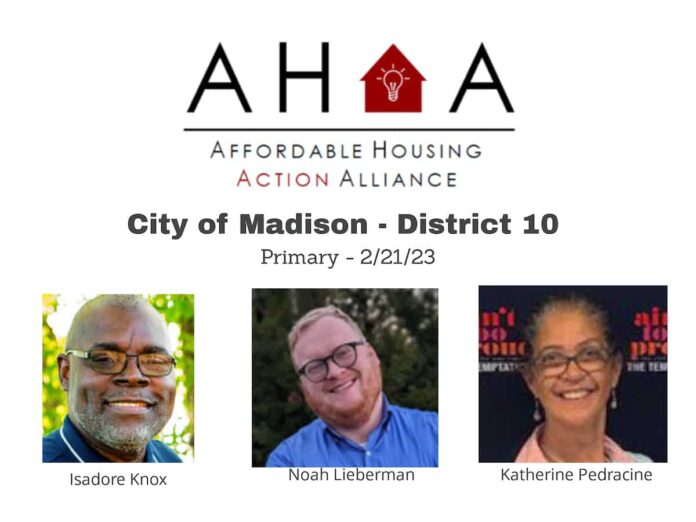While all the candidates say that affordable housing is a priority, read here to find out what they say they will do about it!
District 14 has a primary on Tuesday, February 21, 2022. Here’s a map of district 14, here’s where you find out where to vote. And here’s the candidates on affordable housing! All candidate answers can be found here.
- The City of Madison continues to put money into affordable housing, but we can’t develop affordable housing fast enough or in a large enough quantity for people with incomes that are at or below 30% of the Area Median Income (AMI). What new ideas would you bring to the table to assist us in getting more affordable housing for people at or below 30% AMI?
 Isadore Knox
Isadore Knox
Recently the City has changed the zoning codes and definition of family, so that current property owners can allow for more unrelated individuals to live in households. In addition, the City has provided limited funding for homeowners to develop Accessory Dwelling Units or ADUs where homeowners can develop additional housing units on their properties. The city should continue to invest in the affordable housing fund, to continue to build housing capacity. but in addition, the city should utilize land banking or purchasing small vacant lots within neighborhoods and sell them to residents or develop them for owner occupied duplexes or subsidized low-density multi-unit dwellings, such as four-unit apartments, row houses, town houses at affordable rates. The city should use tax credits, or city low interest loans can be made available for affordable purchases. Selling these units to residents can increase wealth building opportunities for the residents, help reduce the vacancy rate, avoid the problems of high-density developments, and contribute to healthy mixed income neighborhoods.
Noah Lieberman
As a member of the Landlord Tenants Issue Committee, I’ve seen the challenges low-income renters have in finding not only affordable housing, but affordable housing that delivers acceptable living conditions. Our city is plagued with profit-driven landlords who do not live in this city, are not responsive to tenants’ needs, and jack up rent prices to an absurd degree. I support the current city initiatives to build more affordable housing, but I agree that our current plans do not do enough to tackle this problem quickly. Unfortunately, preemptive laws from the Republicans in the legislature tie our hands from taking the most drastic and effective measures as a city – we cannot limit rent increases, we cannot sanction landlords for bad behavior except in the most egregious of circumstances, we can’t even ask for more data on their occupancy rates and prices.
However, the power that has been stripped from the council has not been stripped from the people. A core plank of my platform is having the city help renters organize a tenants union, which can use the collective power of tenants to demand more affordable rents and better living conditions. While the city cannot actively run this union, it can provide resources, connections, and publicity to an organization, kickstarting the process and helping deliver results for all renters.
I’d also support more zoning changes to allow for higher density housing across the city (whether that be in the form of apartments, townhouses, duplexes, condos, or any other form of MFH) as well as allowing for more unrelated people to live together in a single unit. The housing crisis will be my number one priority as an alder, and I will seek to create more affordable housing through any means possible.
 Katherine Pedracine
Katherine Pedracine
Did not answer the questions.
- Much of the affordable housing that is currently being built in our area is Section 42 tax credit housing in which the Area Median Income (AMI) is used to determine rent amounts. And because the AMI is so high in Dane County the rent for many of the units ends up being close to market rate. What can we do to make sure that the affordable housing we build ends up being affordable enough to reach lower incomes? Should Section 42 developments that receive city funding be required to have more units affordable for those at or below 30% of AMI than they do now?
 Isadore Knox
Isadore Knox
Yes , I would encourage requiring section 42 developments that receive city funding to require more affordable units affordable at or below 30% AMI. This should occur in combination with providing financial incentives (rent subsidies) to property owners who develop owner occupied duplexes or subsidized low-density multi-unit dwellings or ADUs at affordable rents.
Noah Lieberman
In an ideal world, I would tie Section 42 housing to a lower percentile of the area income rather than the median (making it 30% of the 35th percentile income, for example). However, I’m unsure what options the city has here since section 42 is governed by federal policy, to my understanding. I would love to hear from you all if I am misinterpreting that issue or our avenues for recourse as a city.
We should certainly be using our funds and influence as a city to push for more affordable housing than is required by federal or state law. I would need to meet with experts in this field to know exactly what leverage the city has in these negotiations with developers compared to their federal incentives.
 Katherine Pedracine
Katherine Pedracine
Did not answer the questions.
- We need more nonprofit developers who are willing to build affordable housing and keep it affordable for longer periods of time. What can we do to get more nonprofit developers in our community and support their growth and success?
 Isadore Knox
Isadore Knox
The city needs to encourage such nonprofits by providing funding incentives to them and low interest loans to build low density affordable housing within mixed income neighborhoods.
Noah Lieberman
Nonprofit developers have a vital role to play in the fight for more affordable housing. I’m proud to be endorsed by County Board Supervisor Anthony Gray, and applaud the work he and others have been doing to develop more affordable housing around the county. In my talks with him, he mentioned the slow and frustrating process of zoning changes as one of the key inhibitors of more affordable housing development from nonprofit groups. I would seek to fast track all affordable housing proposals through the city’s plan commission, recognizing that they are clearly of a higher priority and urgency than other types of requests.
He also mentioned that it can be tricky courting new donors to these projects, as it does not resemble the type of charitable giving that many wealthy individuals are used to. I would seek to give visibility and legitimacy to these projects as much as possible through my role as alder, so that those with the means to fund these projects will be more willing to donate.
 Katherine Pedracine
Katherine Pedracine
Did not answer the questions.
- Most affordable housing is only affordable for a period of 40 years or less, meaning our investment in affordable units is lost after a set time. Please discuss any ideas that you have for keeping affordable housing in Madison affordable long-term?
 Isadore Knox
Isadore Knox
Obviously, the market continues to drive the prices up for affordable housing. It is important that the city continues monitor the percentage of properties that raise rents beyond the affordability levels and replenish the percentage of affordable housing units based on the current needs. Continued investment by the city via the Affordable Housing Initiative and utilizing Tax Incremental Financing (TIF) is critical to producing more affordable housing units to keep pace with the housing rental demand.
Noah Lieberman
Again, I think that a tenants union will be a great way to ensure sustainable affordability in our housing market across the city. Beyond that, we have to make sure that landlords are incentivized to do routine maintenance and upgrades to properties at a regular cadence, rather than forcing tenants out to do complete rebuilds or tear downs that create drastically more expensive units. I think the changes we’ve made to the rent abatement process will help encourage this approach, but I would be open to any other ideas you may have.
 Katherine Pedracine
Katherine Pedracine
Did not answer the questions.
- Tenants in the city and county have had access over the last couple of years to eviction prevention and security deposit funds thanks to the federal government’s COVID relief funding. These funds – the CORE program – likely will end in 2023. Do you think the city should prioritize providing more funds once the COVID money ends and if so, please give some ideas of sources of funding?
 Isadore Knox
Isadore Knox
While the CORE program funds were critical in preventing more evictions and providing security deposit funds, it is obvious that the distribution of such funds to those in most need was poorly executed and temporary at best. Instead of recipients avoiding eviction and utilizing the opportunity to stabilize financially and prepare for the future, we are now facing an even more difficult crisis with no federal funding forth coming.
Obviously, the city will have to prioritize providing more funding to help reduce the growing homeless problem. It is important that the city also invest in incentives to assist potential employers and non-profits to assist renters in skill training and job internships that lead to permanent living wage employment that will allow renters to be able to pay affordable rents and possible even become homeowners. Financial literacy training should also be provided.
One possible additional source of funding could be a developer affordable housing surtax, on all market rate housing developments. This fee can be waived with the appropriate affordable housing units.
Noah Lieberman
Absolutely. I think the most logical place for this funding comes from landlords who are repeat offenders at some of the most pernicious practices we see here in Madison – withholding security deposits, pursuing retaliatory evictions, and having to pay rent abatement for failure to address livability concerns. Placing criminal fees on these offenses in addition to the civil penalties would both encourage landlords to quit their bad behavior and provide a source of revenue for these vital services.
 Katherine Pedracine
Katherine Pedracine
Did not answer the questions.
- Are there any changes that the city could make – zoning requirements, paperwork, etc. – that could make affordable housing development and operation easier and more attractive to nonprofits and businesses, and also less burdensome for tenants who have to complete a lot of paperwork and meet reporting requirements?
 Isadore Knox
Isadore Knox
As mentioned previously, the city has changed the zoning codes and definition of family, so that current property owners can allow for more unrelated individuals to live in the same households. In addition, the City has provided limited funding for homeowners to develop Accessory Dwelling Units or ADUs where homeowners can develop additional housing units on their properties. Financial incentive or property tax breaks should be offered to those homeowners, nonprofits, or property businesses to induce them to develop more affordable units and require them to keep rents at affordable rates. If the funding is local, the requirement should not be so burdensome. Providing trained personnel to assist individuals through the process, having vigilant process auditors and a vigorous complaint process is also required to have an effective program.
Noah Lieberman
As I said above, I would absolutely remove as many barriers as we can for new affordable housing development. Giving these projects an expedited and easier path through the zoning process is an easy first step that will help us tackle the housing shortage in a timely fashion. On the tenant end, we need to simplify these processes as much as possible. I would seek to eliminate duplicative forms for other social services, allowing residents to apply for all at once without using as much time or effort. I am not as familiar with the particular reporting requirements for these various services, but I plan on working with city staff and other experts to find places to automate and streamline the processes.
 Katherine Pedracine
Katherine Pedracine
Did not answer the questions.





